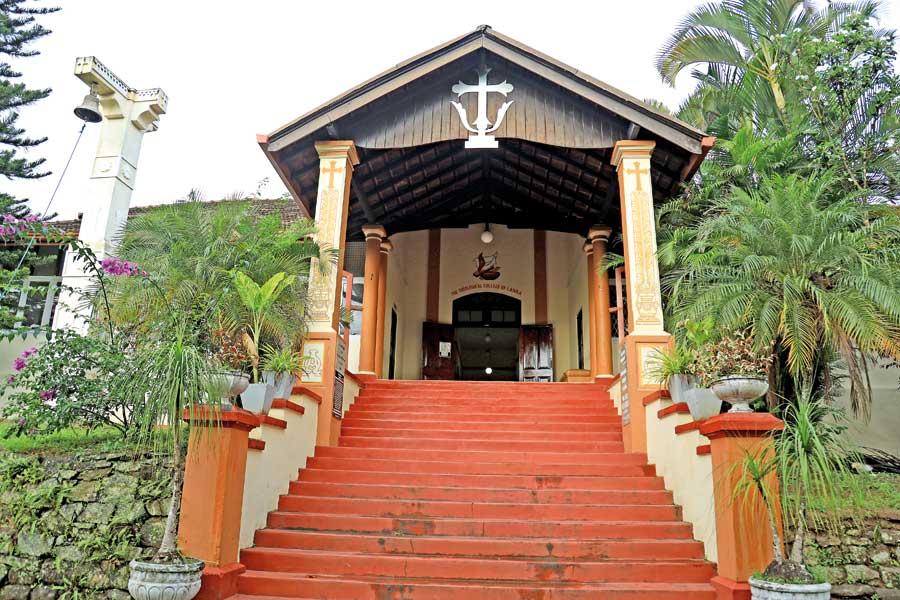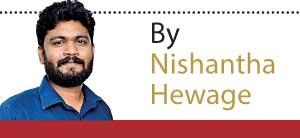07 Jul 2023 - {{hitsCtrl.values.hits}}

Theological College of Lanka main building
Becoming a sustainable missional community is the theme of the Theological College of Lanka’s (TCL) diamond jubilee celebration this year. Since its inception in 1963 and in its 60-year journey, TCL has been a pioneer in providing future clergy and lay workers with theological education in Swabhasha—Sinhala and Tamil. The contribution that TCL has rendered to Sri Lanka’s theological education and its emphasis on indigenization and ecumenism (church unity) have marked its uniqueness. As the TCL celebrates its 60th anniversary on July 10, Daily Mirror reached out to the college community to get a clearer picture of the history, life, vision and way forward for the college.
journey, TCL has been a pioneer in providing future clergy and lay workers with theological education in Swabhasha—Sinhala and Tamil. The contribution that TCL has rendered to Sri Lanka’s theological education and its emphasis on indigenization and ecumenism (church unity) have marked its uniqueness. As the TCL celebrates its 60th anniversary on July 10, Daily Mirror reached out to the college community to get a clearer picture of the history, life, vision and way forward for the college.
Founding and historical significance
Established in 1963 jointly by the Anglican, Methodist, and Baptist Churches, TCL was a pioneer in educating new clergy in the Sri Lankan context and their mother tongue—Sinhala and Tamil. Later, the Presbyterian Church also joined the venture. TCL’s founding principal was British Methodist missionary Rev. Basil Jackson. The college’s foundation was an important concept towards ecumenism—the belief that different Churches should unite.
Speaking to Daily Mirror former Anglican Bishop of the Kurunegala Diocese, Rt. Rev. Keerthisiri Fernando said, “Before the establishment of TCL, pastors were educated mainly in India or elsewhere. Prior to the TCL’s foundation, Colombo’s Anglican Church had a divinity school where they trained their clergy. The Methodists and Baptists sent their candidates to colleges like the United Theological College in Bangalore.” He said in the late 1950s the Anglican Church had invited other denominations to discuss the idea of starting an ecumenical theological college. He noted when the college had been started, the vision had been to form the united church.
Rt. Rev. Fernando added, “While celebrating the 60th anniversary, we must remember that TCL is a model for the country as it educates future ministers in Swabhasha. Even other religions are taught at TCL by religious leaders who are specialists in their fields. Thus, students are able to learn about other religions from their own religious perspectives. This strengthens the religious harmony that TCL has been upholding for years.” Rt. Rev. Fernando said more than half of his ministry had been spent at TCL. “Today we are called to look at diversity in unity. We need to start with diversity. Without diversity, we cannot have unity. In diversity, we need to understand that we depend on each other. Today, we need to emphasise diversity in unity and with that vision, we need a model to engage in our theologising process as we prepare ourselves for our ministry.”
The establishment of TCL is a milestone in theological education in Sri Lanka, as it was the first mainline protestant ecumenical theological seminary after the Dutch Reformed Church seminary, which had functioned in Colombo from 1702 to 1796. The launch of TCL was aided by the Theological Education Fund Committee of the World Council of Churches. The new venture placed in the local context was a great challenge for the first Principal, Rev. Jackson, the denominational heads, and faculty. The establishment of TCL was an attempt to produce indigenous theology, firmly grounded in local culture, traditions and languages.
Academia
Classes at TCL are held mainly in Sinhala and Tamil, and English when required. Sinhala and Tamil students are encouraged to write, research and express themselves in their own languages, while also learning each other’s languages and English as well. The main subjects taught are theology and ethics, ministry and communication, Biblical studies, the history of Christianity, and religion and society. Tamil students learn practical Sinhala, Sinhala students learn practical Tamil, and English is learnt as a link and global language.
TCL is affiliated to India’s Senate of Serampore College and accredited by the Association of the Theological Education in South East Asia (ATESEA). More than 90% of the active clergy in the constituent mainline Churches in Sri Lanka have passed out from TCL. TCL not only maintains its ecumenical foundation but also seeks to bridge ethnic, language, class, caste, and gender divisions among students and the community.
In addition to the Bachelor of Theology degree, TCL also offers programmes like the diploma in counselling and group skills. This was introduced in 2006, and it has equipped social workers and school teachers to work among survivors of war and less privileged groups. A diploma programme in education on special needs was introduced in 2009. External candidates from all religions can enrol in these programmes.
Geared for a greater mission
|
Rev. Nadarajah Arulnathan - Principal TCL |
Referring to the 2014 book, ‘The Splendor of Nandana Uyana- The History of the Theological College of Lanka’, TCL’s Principal Rev. Nadarajah Arulnathan outlined some reasons that led to the foundation of TCL. He noted there was a greater need at the time to offer an ecumenical and uniting space for ministerial formation for a wider fellowship of the Churches and Christian community. Secondly, he said TCL was founded to undertake the formation of the leaders and ministers in our own soil, meaning our own socio-economic and cultural context. Thirdly, he said TCL was established to encourage ministries of justice, peace and reconciliation. As the fourth reason, he said, “TCL was founded to strategise ways of equipping the laity. Thus, TCL was the first and most important official ecumenical move in the Churches in Sri Lanka.”
Recalling more contributing factors to TCL’s foundation, Rev. Arulnathan said, “TCL was founded to promote ethnic integration as a response to the wider context that existed in that period. Not only ecumenically, but also inter-culturally and inter-ethnically, this initiative becomes important.”
He added, “We should not forget why we are existing and should remember the mission: Ecumenical formation, lay training, promoting Christian-Buddhist dialogue, and enhancing relationships with all people.”
Explaining the importance of the 60th-anniversary commemoration, Rev. Arulnathan said, “Having TCL’s mission in mind, we have created a three-year road map to re-ensure our commitment and revitalise our activities. The theme for this diamond jubilee celebration is ‘Becoming a Sustainable Missional Community’. We have chosen this theme to better respond to the crises we are facing—political, socioeconomic, environmental, and spiritual.” He added the College Graduation and Thanksgiving Day would be held on July 10 with the participation of the Serampore Commission, Queens Foundation, and Heads of Churches. Serampore College Senate’s Registrar, Rev. Dr. Limatula Longkumer will be the Chief Guest of the event.
Discussing future prospects, Rev. Arulnathan said, “There are seven priorities we are working on: Institutional administration development; faculty development; financial sustainability and resource mobilization; UGC accreditation of academic courses; research and publication to enhance local scholarship; digitisation and media competency; and Cartelistic lay training where minds meet.”
Speaking to Daily Mirror, Church history lecturer, Rev. Sarath Wickramasinghe said the students aspiring to become future ministers come from various social backgrounds. “There are students from the northern, eastern, southern and western parts of the country. Many students from the Malaiyaha community also study here. We have both Tamil and Sinhala students,” he said.
Formator and lecturer, Rev. Jothini Seenithambi said, “TCL is not merely a Bible college or a college that provides education, but TCL’s formation embeds practical activities, starting with morning worship to observing a grand silence in the evening. TCL provides candidates with an ecumenical, multi-linguistic and gender-balanced formation.”
She added, “TCL has a practical connection with other religions, too. Even our students visit temples, mosques, and other religious places and become familiar with aspects of other religions.”
Student voices
“Amid many challenges, TCL has continued its journey to this day. We need to gratefully remember the efforts and commitment of the people who pioneered in establishing this institution. I consider it a blessing to be a part of TCL’s diamond jubilee celebrations as a student,” said Batticaloa’s 24-year-old Anoja Jesudasan, a first-year student at TCL.
Ms. Jesudasan said TCL provides a conducive environment to engage in theological studies. She said before joining TCL her proficiency in English and Sinhala had been low. “I didn’t use Sinhala much before I came here. Now TCL has given me many opportunities to learn Sinhala and English other than Tamil, my mother tongue, she said.
Another student, Nuwara-Eliya’s 44-year-old Perumal Mathiyalagan , said, “As someone from the Malaiyaha community, who have been denied land rights and other vital rights, I consider training to be a future minister at the TCL a privilege.”
Mr. Mathiyalagan said TCL’s 60th-anniversary celebration symbolised the remarkable achievement of creating a strong community, driven by a noble social vision. “Our 60th year is a reminder of the various initiatives undertaken and successfully implemented within communities by TCL. These include collaborations with religious leaders within diverse cultural environments,” he said.
Another student, Colombo’s 28- year-old Kenneth Dhanapala said, “The TCL community comprises people with different abilities and talents from various cultures and backgrounds. At TCL, we are also given the opportunity to learn new skills. The faithful journey of the college today teaches how valuable it is to become a sustainable missional community in the present context.”
10 Jan 2025 41 minute ago
10 Jan 2025 46 minute ago
10 Jan 2025 2 hours ago
10 Jan 2025 2 hours ago
10 Jan 2025 2 hours ago